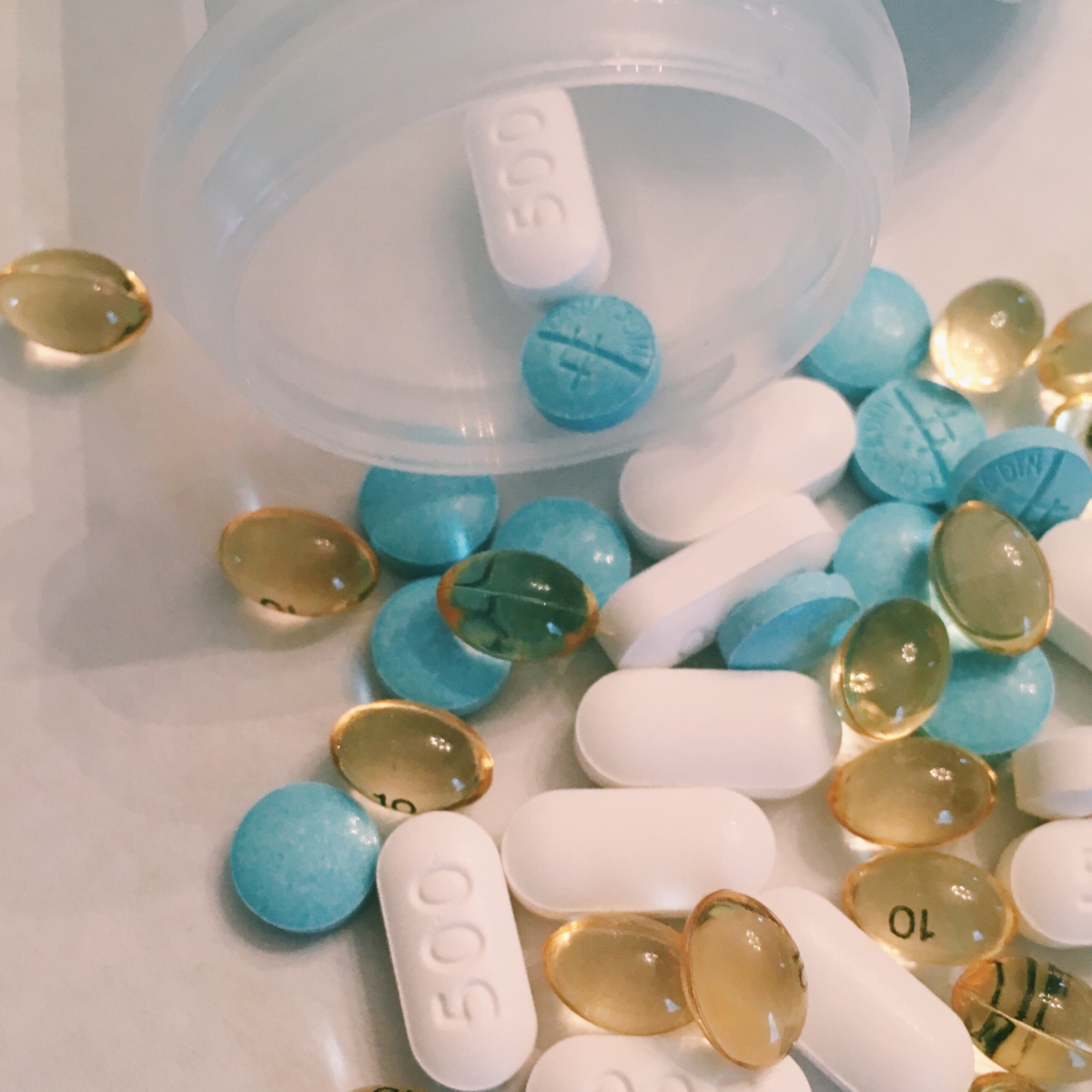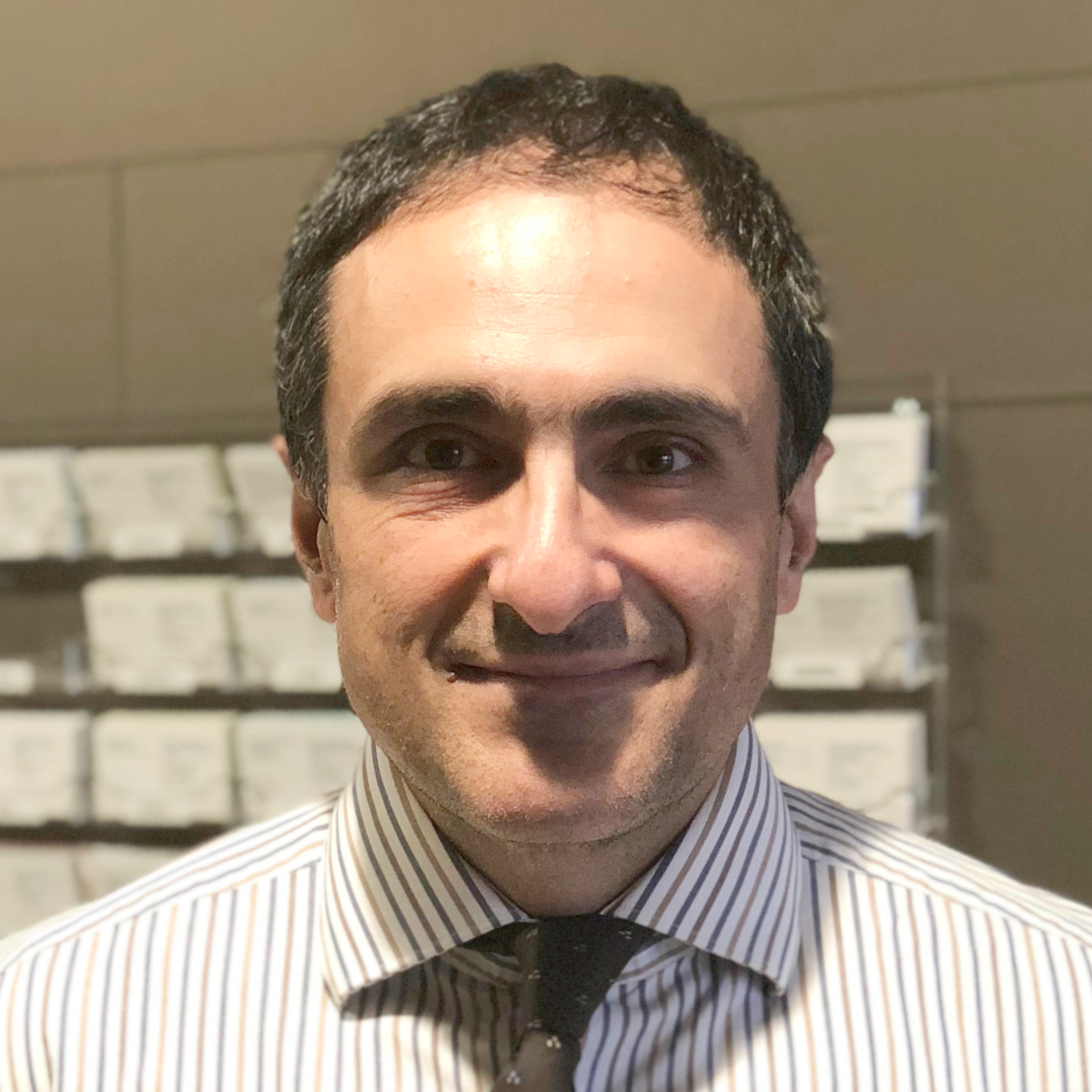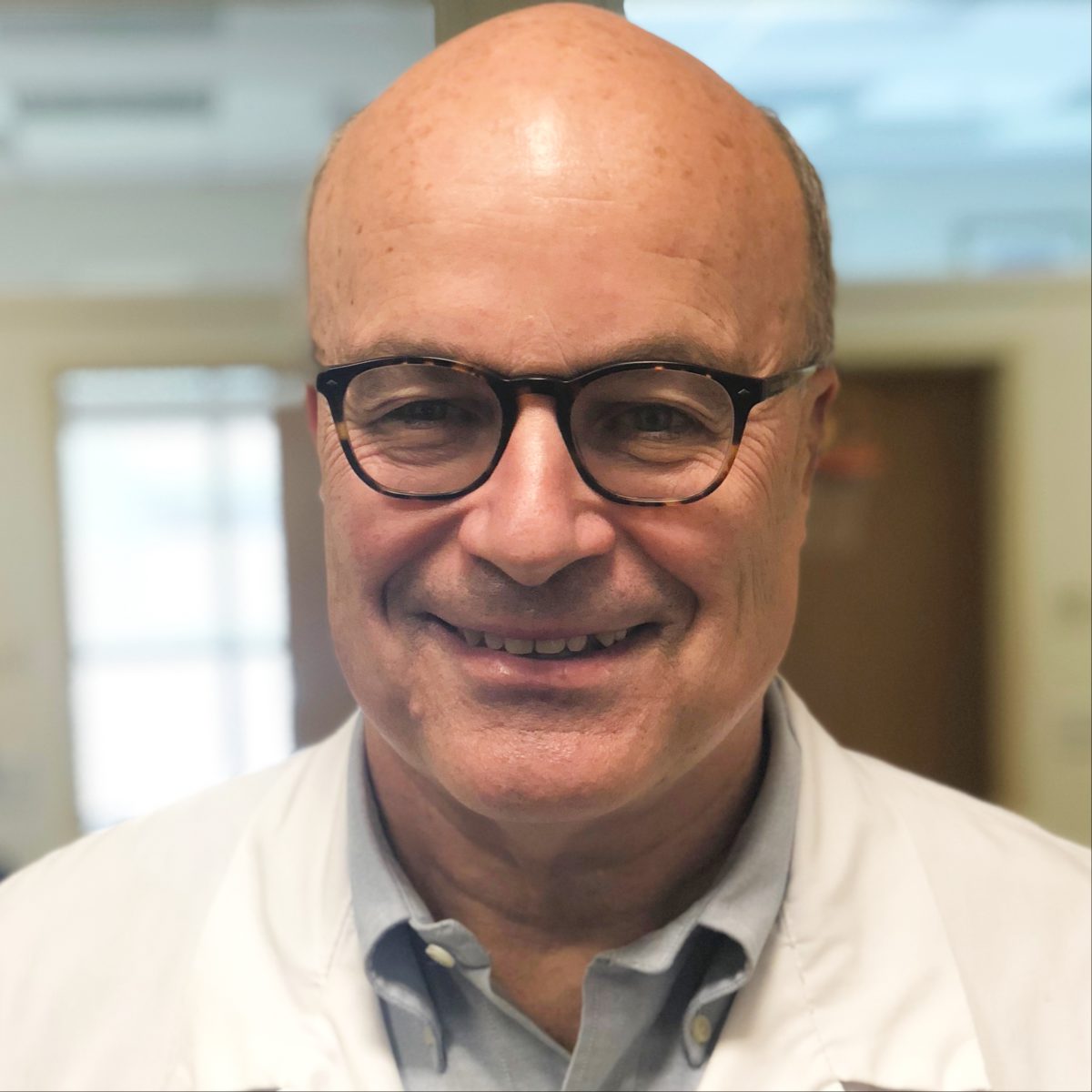Latest on CLL Treatments
Chronic lymphocytic leukemia (CLL) is the most common form of adult leukemia in the United States. Thankfully, there has been a significant amount of research dedicated to finding new treatments and therapies to help CLL patients of all ages.
But understanding what’s out there can feel so overwhelming. This page will feature all the programs and experts who highlight different treatment options and areas, taking out as much medical jargon as they can to help us patients and caregivers better understand what’s on the table.
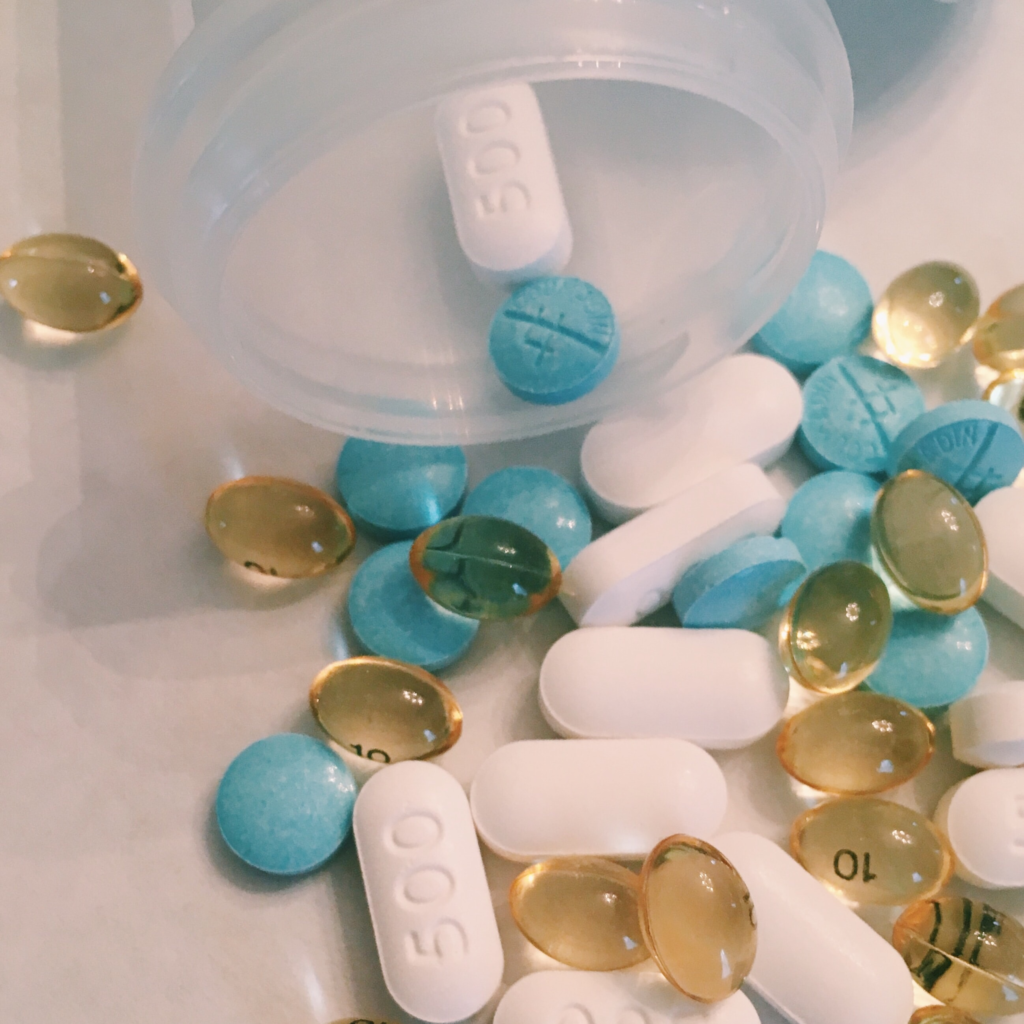
Panel of CLL Specialists

Dr. Kerry Rogers
Dr. Kerry Rogers, an associate professor and hematologist/oncologist at Ohio State University’s The James Cancer Center, shares in-depth insights into her work on CLL treatments, as well as a study on the much rarer hairy cell leukemia.

Dr. Jacqueline Barrientos
Dr. Jacqueline Barrientos, an associate professor of hematology/oncology and oncology research at Northwell Health, talks through what CLL is, treatment options, and the trend of drug research.

Dr. Tim Fenske
Dr. Tim Fenske, an associate professor and hematologist/oncologist at the Froedtert Hospital Cancer Center, discusses what CLL is, what determines whether someone needs treatment, and the focus of newer CLL drug research.
Standard CLL Treatment
There have been multiple different types of treatment used for chronic lymphocytic leukemia. They include, but are not limited to:
- Watchful waiting
- Chemotherapy
- Chemotherapy with a transplant
- Radiation therapy
- Immunotherapy
- Targeted therapy
Shifting Away from Chemotherapy
Dr. Kerry Rogers, a CLL specialist at Ohio State’s The James Cancer Center, says the first thing to acknowledge is the median age of patients diagnosed with CLL – those in their mid-60s or almost 70. This means there may be other factors impacting their overall health.
It’s always important to think about what other health conditions someone has when planning treatment.
Dr. Kerry Rogers
Dr. Rogers adds it’s been a goal in the CLL medicine field for quite some time to ensure some treatments are appropriate, even for older patients who are in their 80’s and even 90’s who have other health conditions.
For our interview, Dr. Rogers explained more about chemotherapy in the context of “younger, fit people because I think it’ll be easier to understand in that setting.
We’ve always had some chemotherapies that could lower the white count or improve symptoms. But the mark was moved on how long people are living with CLL or survival by combinations of chemotherapies with an antibody medication called rituximab.”
Fludarabine, cyclophosphamide, rituximab (FCR)
For many decades, research was spent developing a regimen known as FCR, or fludarabine, cyclophosphamide, and rituximab. Rituximab is the antibody and the other two are chemotherapies.
Bendamustine and rituximab
Dr. Rogers points to a similar regimen that can be used in people who may be less able to tolerate chemotherapy, called bendamustine and rituximab.
“These are highly effective chemotherapies that could be given to most reasonably healthy people and can control the CLL for years,” says Dr. Rogers.
When to start CLL treatment
In many cases, you can wait, says Dr. Tim Fenske. He says doctors are able to run tests on patients when they are first diagnosed by checking biomarkers. Some of the procedures useful for predicting prognosis include:
- chromosome tests
- protein stains
- mutation analyses
There are patients with CLL who have a more aggressive form of the disease, and cannot opt into “watch and wait” for very long, if at all. Others, says Dr. Fenske, will not get treatment until five or 10 years after diagnosis.
He adds, “These biomarkers are reasonably good at predicting whose disease is going to be a slow mover versus a fast mover, but they don’t actually tell us who needs treatment at that moment. These biomarkers are more for giving us an overall idea of how the disease is going to go: fast or slow.”
The actual decision to treat or not treat is based on more basic things like whether or not the patient is anemic or has a low platelet count. Other symptoms might include fevers, drenching sweats, weight loss, extreme fatigue, or pain from enlarged lymph nodes.
Those kinds of things would influence a decision of whether to treat or wait.
Dr. Tim Fenske
How does a specialist decide on a course of treatment?
Dr. Jacqueline Barrientos points to specific factors like genetic markers that play a role in treatment decision-making. One is the 17p deletion marker. If a patient has that marker, Dr. Barrientos says they should be on a targeted agent like ibrutinib, a Bruton’s tyrosine kinase (BTK) inhibitor.
It doesn’t kill the cells, but it tells them to stop surviving and proliferating so eventually the cells start to die, but it doesn’t work immediately. You have to take the drug every day.
We just published some data comparing that drug against the best chemo regimen. The big winner was ibrutinib. Even in younger people, the best therapy is a targeted agent. Not only in patients with 17p, but with other markers as well.
For unmutated patients, we stay away from chemotherapy. We only do targeted agents. Right now, category guidelines in the United States say to give you ibrutinib. It is frontline for young people and older people.
Dr. Jacqueline Barrientos
Targeted Therapy
ibrutinib and venetoclax
Two of the most forefront targeted therapies are ibrutinib and venetoclax, says Dr. Rogers.
“It’s important to know that as a first treatment, our new targeted agents, like ibrutinib and venetoclax-based treatments, were compared to these chemotherapies and had longer progression-free survival. This is a measure of how long people are alive without their leukemia returning.
We have found that these targeted agents were actually better than these chemotherapies.
Dr. Rogers
That means people lived longer without their CLL coming back after they took the non-chemotherapy targeted agents. Also, they have a different group of side effects that are generally better than chemotherapy.
»MORE: Read more about ibrutinib and other patient experiences
Choosing between Chemotherapy and Targeted Therapy
So how do people choose between chemotherapy and targeted therapy? According to Dr. Rogers, some people opt for chemo because it’s a different path than targeted agents, or because they have a health conditions that makes the targeted therapy route less appropriate.
These days, the vast majority of CLL patients should be receiving treatment with a targeted agent and not with chemotherapy.
Dr. Rogers
She says it’s also very uncommon for CLL patients to undergo chemotherapy now. “The one exception to that is young fit patients. IgHV mutated people and don’t have a high-risk feature such as deletion 17p can have 10 years or more of being alive with no detectable leukemia after getting FCR.
A group of younger people fit for chemotherapy treatment are those mutated and don’t have deletion 17p, called a TP53 mutation. But they might choose to get FCR because it might actually cure them.”
I don’t know what else to call 10 years of being alive without detectable leukemia. We don’t usually say CLL is curable, but this is the one case where it might be.
However, she points out that there are a lot of risks to undergoing the FCR chemo regimen. One is the possibility of developing a different type of leukemia called acute myeloid leukemia (AML). That may happen down the line from damage to the bone marrow caused by FCR.
“That is the one case where it could be very important to offer chemotherapy, especially to young healthy people that might want to do a treatment course of about six months and then potentially never need treatment again in their lifespan,” explains Dr. Rogers.
“It’s not a guarantee that they’ll never have leukemia come back, but that is the one case where it’s important to think about it. But for the vast majority of other people, targeted agents are safer and more effective.”
How long have the targeted agents been in use?
The BTK inhibitors were developed in the last decade, and venetoclax shortly on the heels of that. When things are through phase III studies, that’s when they start being prescribed more commonly.
We—the academic centers—get to use all these drugs and people that come see us here might benefit from taking them as a participant in a clinical trial.
I’ve seen many people who did really well doing a research study to get a newer drug that later became approved. This becomes more widely available and used by general practice, hematologists, oncologists after phase III studies.
Treatment for Relapsed/Refractory CLL
Treatment for relapsed/refractory (R/R) CLL
The two standard options are BTK inhibitors and venetoclax, which Dr. Rogers characterizes as both highly effective.
“If patients haven’t taken either class of drugs, they’re both excellent, and you can pick based on preferences and side effects.”
BTK inhibitors
There are BTK inhibitors, which are pills that target a protein called BTK. This blocks a cell signaling pathway called B cell receptor signaling. This makes the CLL cells not behave like CLL cells and die off over time.
The two main BTK inhibitors that are approved for CLL are Ibrutinib and Acalabrutinib. Ibrutinib is a once-daily pill. Acalabrutinib is more selective and targets pure things that ibrutinib does. It is a twice-daily pill.
Ibrutinib and acalabrutinib are both excellent options. They’re usually given by themselves, although they can be given with an antibody medication in some cases.
Venetoclax
The other option is another oral targeted agent called venetoclax. It inhibits a protein called Bcl-2, which is an anti-cell death protein. If you block an anti-cell death protein, that’s like a double negative, and it kills the CLL cells really fast.
The problem with this drug is that it has to be started slowly so people can be monitored. It can work so quickly that it can cause tumor lysis syndrome. It is usually given with an antibody and requires monitoring.
Venetoclax treatments are given in a shorter duration. If people are taking it as a first treatment, you give it with an antibody called obinutuzumab and take it for one year. If you’re giving it after people have already gotten treatment, you usually give it with an antibody called rituximab, and you take it for two years.
It’s whether or not they’ve taken treatment before it determines whether or not you take venetoclax for one or two years.
Venetoclax vs. BTK inhibitors
Venetoclax is like a time-limited treatment versus BTK inhibitors, which you take indefinitely till they stop working or you develop side effects and have to quit.
Some people have very strong feelings about if they want to take something and just get it done and stop, or if they’re just fine adding another pill to their pillbox. They don’t want to bother with antibody infusions. They just want to take some pills and go back to working or golfing or whatever it is they want to do.
Both are usually tolerable for the majority of patients. The ones who take long-term, obviously, for some patients have more chronic side effects.
Targeted Therapy Side Effects
Both these treatments are so effective, if you’ve never taken venetoclax or BTK inhibitors before, you can really pick based on your preference for treatment duration, and what side effects may or may not matter for your other health conditions.
btk inhibitors side effects
The main side effects of BTK inhibitors are:
- Bleeding
- Bruising
- Cardiovascular side effects
- Increase in blood pressure – high blood pressure can increase the risk for things like heart attacks and strokes. Overall, it can decrease cardiovascular health.
- Abnormal heart rhythm called atrial fibrillation, or a-fib. A-fib is usually not life-threatening but is very irritating to deal with.
In addition, it can sometimes cause:
- Joint aches or pains
- Inflammatory arthritis
- Diarrhea
- Heartburn
- Rashes – those usually go away or are less of a problem
Most people find the side effects from the BTK inhibitors tolerable, so they still go about their life with these things.
But for someone that has atrial fibrillation or is taking several blood pressure medications already, this might not be the best idea. People with bleeding disorders or who need warfarin anticoagulation don’t want to take this class of drugs if they have options.
Venetoclax side effects
Venetoclax, on the other hand, can cause tumor lysis syndrome at the start. All the CLL cells die so quickly it releases toxins into the blood. That’s treatable, but if you don’t watch out, it can be life-threatening or fatal.
You actually have to start the dose low and increase it slowly. People take a low dose, and over five weeks, they increase the dose every week to get to the full dose of venetoclax, which is 400 milligrams. They have to come for at least two days in a row for blood tests or monitor tumor lysis syndrome every time.
»MORE: Cancer patients share their treatment side effects
With this monitoring scheme, it’s very safe, and people developing tumor lysis syndrome can get that treated usually with medications. Things seem to go very well for people, but it’s a lot of hassle to do that.
To protect people from tumor lysis syndrome, they have to stay hydrated. People who have heart failure, take diuretics or have kidney impairment, which could make tumor lysis syndrome more common and more dangerous, might not want to go this path just because that’s a greater risk to their health.
Once people are at the target or treatment dose of venetoclax, it actually seems to have fewer chronic side effects than the BTK inhibitors. Some of them include diarrhea, lower neutrophil count or neutropenia (neutrophils are infection-fighting cells).
People can sit down and look at their health conditions. If they have severe kidney impairment, they probably want to take a BTK inhibitor. If they have abnormal heart rhythm problems, they would want to take the Venetoclax.
It’s a decision you make together with your treating physician.

I sometimes see patients considering their options for first treatment who ask me right off the bat, “Which one should I do?”
I say, “I don’t know, we just met. I need to ask you some things about you, and then I can tell you what you might want.”
I think these are really important, and the discussion is very similar for people picking a treatment that has taken before but never taken either of these classes of drugs before.
»MORE:Learn more about the process of clinical trials from one program director
Continuous novel agent therapy vs. time-limited
There are two other categories of CLL treatment – novel agents that have to be taken continuously, sometimes indefinitely, and those that will have an end date.
Dr. Rogers talks about how people have weighed their options in continuous versus time-limited therapies. “In 2018, we had those randomized phase III studies comparing ibrutinib regimens to FCR or BR reported that ibrutinib had a longer progression-free survival, which is, again, being alive without leukemia. That really put those in very widespread use.
There is some resistance to it just because you have to take the pills for a long time. You take them indefinitely until either leukemia comes back while you’re taking them, you develop a side effect and have to stop taking them, or you have some other health condition that you have to stop.”
But she says that results of younger patients on ibrutinib were better than those on FCR, resulting in what’s known as a survival advantage. That means those people were more likely to be alive on ibrutinib compared to FCR.
When you explain to them that, yes, it is not the first choice, most people decide that that’s better than something that has a shorter progression-free survival or doesn’t work as well.
Most people are more comfortable taking pills long term when they find out that it works better than chemotherapy.
Clinical Trials
Triple Therapy (Ibrutinib, Venetoclax, Obinutuzumab)
There are constantly clinical trials ongoing to make treatments better for people. Dr. Rogers points to a study of a triple therapy combining the BTK inhibitor ibrutinib, venetoclax, and an antibody, obinutuzumab, as a treatment for one year.
“It’s ongoing in follow-up, but everyone in this study has completed treatment. When you give more drugs together, you get more side effects,” says Dr. Rogers. “It’s not a surprise, but the nice thing about this is it’s one year, and now we’re seeing how long people remain in remission at the end of that one year of treatment.”
So far, we’re at about three years of follow-up, and it looks very good.
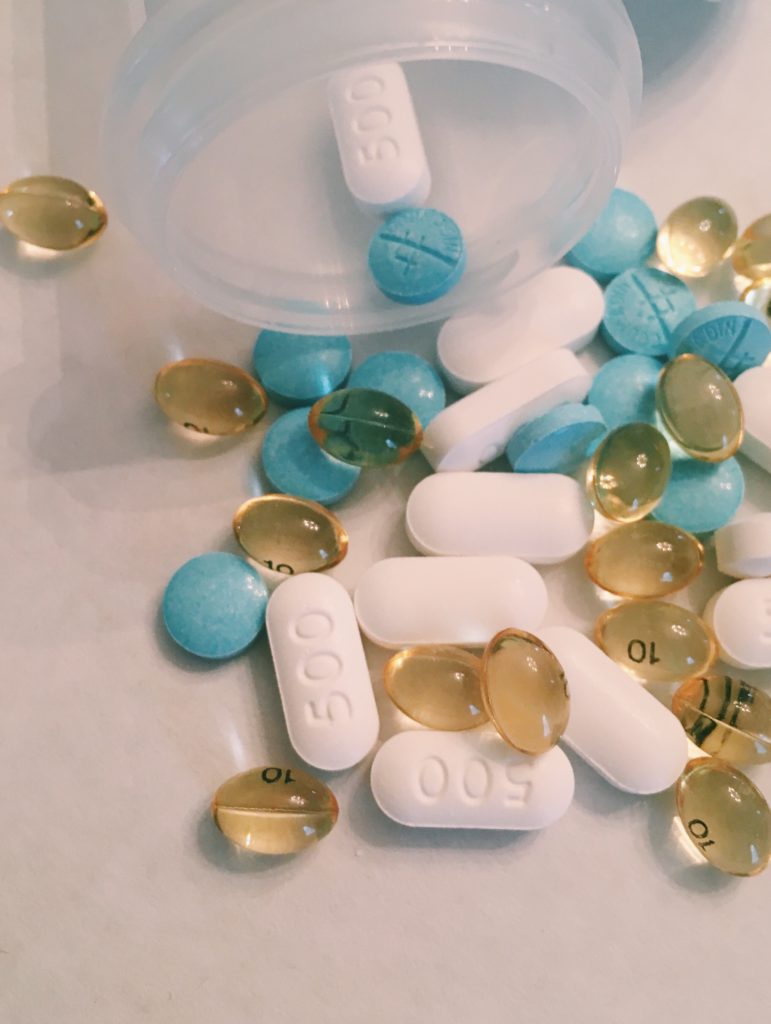
Several other studies are going on for BTK inhibitor and venetoclax combinations. The medical field expects the response rates to be very high and looking to understand how long people remain in remission.
Dr. Rogers says there’s also hope to learn more as the follow-up grows longer, specifically in what patient populations may benefit the most from this new triple therapy combination and who will stay in remission longer compared to other treatments.
I’m just super excited that we really move the mark and get regimens into the standard of care in CLL and are able to do a randomized phase III trial, where you sign people to treatment in your treatment.
Dr. Rogers
She adds that “there is no placebo here, and usually, you know which one you’re getting to, after you randomize. You don’t know when you sign up, but you know before you get treated.
You take the antibody for a limited time, but the ibrutinib indefinitely, and then the three-drug combination, ibrutinib, venetoclax and obinutuzumab given for a fixed duration. You don’t take it forever, and they’re looking at progression-free survival.”
»MORE:Read more on FDA approvals of clinical trials
I am excited to see over the next several years how that turns out, and I’ve also treated several people in that study who were really excited to participate in it.
Metrics for these studies
When you pick a new standard, you compare standard treatment, which in this case is ibrutinib and obinutuzumab, to an investigational treatment, which is that three-drug combination.
The main goal is to determine progression-free survival: how long people are alive without leukemia and if one’s longer or shorter than the other. That’s a measure of how effective these things are.
Some studies use the overall response rate, but these drugs are so effective that they don’t really work out CLL because everyone responds to these things, which is great, by the way.
Then, when we look at the patients in the study who had high-risk features, low-risk features. Then we see how our high-risk patients did compared to high-risk patients with the other treatment.
For ibrutinib, some people have their leukemia come back while they’re still taking it.
Determining resistance to treatment
We have some neat studies going on at our institution and some other institutions across the country, looking at how we can identify who’s developing resistance to ibrutinib before they actually get sick.
We can look at mutations in BTK, which is the protein that binds at the drug binding target. Once people develop mutations in BTK, in particular spurts, we know that the drug will stop working.
We’ve offered them clinical trials to add a second drug like venetoclax to reduce this resistance and see if we can keep the leukemia from relapsing and be healthy for longer.
The CLL Community is looking at adding a second drug to people who are on ibrutinib and doing well. Remember, I said that ibrutinib, and actually, acalabrutinib II, which is the other BTK inhibitor, changed the way the CLL cells work and behave, but it doesn’t actually kill them off.
Lots of people still have CLL floating around, which is why we think they need to keep taking those drugs. We’re wondering if people can have another drug added to it to just knock out those residual leukemia cells. That way, they can be in off-treatment remission. If you do that, then they won’t be on it long enough to get resistance ideally.
Importance of clinical trials
It’s always good to know what your standard options are, and what your clinical trial options are.
For people who haven’t taken BTK inhibitors or venetoclax, those are good standard options. For people who are resistant to both those, usually clinical trials are your best option.
You always want to know what drug is being studied, how the study is going, who’s been in it, and what your doctor expects from the study.
Misconceptions about clinical trials and “placebos”
In cancer trials, you would know there was a placebo because you have to sign a consent saying there’s a placebo. But it’s usually considered unethical to give people who need cancer treatment a placebo.
It will explain if it’s randomized and what are the treatments that you would be getting. A lot of studies, especially the ones we have, are studying very new treatments. Sometimes they’re studying the dose of the drug.
You should know exactly what drugs you’re getting. It can feel really weird but you should consider your options.
With the state of cancer research these days, we actually have a very good feeling that these drugs are going to help patients before we give them to patients. Many of them have been studied obviously in the lab using CLL cells; cell lines have been studied in animal models of CLL.
We don’t start trials with new drugs until we’re fairly confident that it will help people. I’ve seen many patients benefit from drugs that they wouldn’t be able to get just because they’re not yet approved.
If anyone’s considering it and unsure if they have someone they know in the CLL community or peer support for someone that’s been in a clinical trial, it’s always good to talk with people who have done it just because the individual benefit to doing something like that can be significant.
People always tell me, “Oh, I feel like I’m your guinea pig.” I’m like, “Oh, you should be so lucky to be my Guinea pig, you know what that thing’s lifestyle is?” I was like, “My personal guinea pig is not an experimental animal. It’s my pet, has a super nice lifestyle. People would love to be my guinea pig.”
But really, people aren’t guinea pigs as much as you think. If you’re considering a research study, make sure you get to ask all the questions about what the drug is and why being in this study might benefit you or others, and your doctor should be able to answer those questions for you.
Up and Coming New CLL Treatments
Dr. Rogers details two new areas of study for CLL treatments – CAR T cell therapy and reversible BTK inhibitors. Read the information from her interview below:
CAR T cell therapy
CAR T-cell is exciting. It’s still investigational for CLL, but I’ve seen it help a subset of patients, especially those that are resistant to these drugs I’ve been talking about. It can be very powerful for select people, but it is a hassle to do, and it is still investigational.
For people who have very good, other treatment choices, it’s usually not something we run to as a first treatment or even a second treatment. But it can be great for people that need that.
Reversible BTK inhibitors
The things that I’m excited about are some drugs that are hopefully going to move up to benefit more patients. We’re always trying to make treatment safer, more effective.
There’s reversible BTK inhibitors. Ibrutinib and acalabrutinib bind BTK at the same site and bind it irreversibly, meaning forever.
Reversible BTK inhibitors bind at different sites than the two approved ones and bind and unbind BTK, which seems to limit some of the side effects.
Also, for some reason, these drugs can work in people who are resistant to the BTK inhibitors, which you expect ’cause they bind to it at a different site but can work in people resistant to BTK inhibitors and Venetoclax. They seem to be very well tolerated.
A reversible BTK inhibitor such as LOXO-305 (pirtobrutinib) is now under study. LOXO-305 is the one that’s the furthest in development, and they just gave it a direct name.
It’s just exciting when I go to professional meetings to see what new types of drugs are being developed in CLL or things like cyclin-dependent kinase inhibitors that are coming back into play. These drugs, either alone or in combination, are likely to benefit patients.
Again, we keep moving the mark more and more towards safe, highly effective treatment, and it just keeps getting better.
New drugs with new mechanisms, drugs with the same mechanism but in a different way—these are the way we move the mark in CLL.
It seems to have fewer side effects, not no side effects. Anyone that tells you there’s are no side effects is lying. You never get anything for free or don’t do anything. But, that, and also because the mechanism is different from the irreversible BTK inhibitors, it can be used in resistance.
If someone takes ibrutnib until their leukemia comes back while they’re taking it, taking acalabrutinib isn’t going to work because they have the same mechanism. But taking a drug that binds the same protein but with a different way of doing it can work after your resistance.
This allows people to take two BTK inhibitors before moving on to a drug like Venetoclax or other treatment options. They’re just really effective, especially in people with really resistant CLL. It’s not just that there are fewer side effects, but also they seem to work great, which is awesome.
More Medical Expert interviews
Dr. Christopher Weight, M.D.
Role: Center Director Urologic Oncology
Focus: Urological oncology, including kidney, prostate, bladder cancers
Provider: Cleveland Clinic
...
Doug Blayney, MD
Oncologist: Specializing in breast cancer | HER2, Estrogen+, Triple Negative, Lumpectomy vs. Mastectomy
Experience: 30+ years
Institution: Stanford Medical
...
Dr. Kenneth Biehl, M.D.
Role: Radiation oncologist
Focus: Specializing in radiation therapy treatment for all cancers | Brachytherapy, External Beam Radiation Treatment, IMRT
Provider: Salinas Valley Memorial Health
...
James Berenson, MD
Oncologist: Specializing in myeloma and other blood and bone disorders
Experience: 35+ years
Institution: Berenson Cancer Center
...
